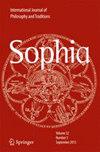Heidegger’s Answer to Plato’s Parmenides
IF 0.5
3区 哲学
0 PHILOSOPHY
引用次数: 0
Abstract
Abstract Plato’s dialogue Parmenides remains one of—if not, the —most perplexing text in the Platonic corpus. Specifically, it examines the difficulties surrounding the concepts of unity, multiplicity, and Being that are required for participation in the Ideas. One of the problems forced upon the young Socrates by Parmenides and Zeno in the second half of the dialogue concerns the relationship between Being (ὄν) and the One (ἕν), namely, how defensible is the oneness, or the unity, of the Idea if it also partakes of Being? The text culminates in an aporia as to how to articulate the difference between the One (ἕν) and the many (πολλά), since if the one is , it becomes many. How do many beings share in the one mode of Being? Crucially, how are we to articulate the difference between the One and the many, or Being and beings? Where Plato’s answer invoking the enigmatic concept ‘ exaiphnēs ’ (ἐξαίφνης), the temporal becoming of the unity and plurality of the One, seems to contradict the privileging of presence that Heidegger charges him with, he nonetheless fails to offer an understanding of difference that has neither Being nor unity. I argue that Heidegger’s engagement with the problem of the ontological difference, and its development into the identification of Being with difference itself, offers solutions to this aporia in Plato’s Parmenides by addressing a difference that is irreducible to the one or the many, the relational or the derivative. This has significant consequences for understanding Heidegger’s critique of Plato as not just consisting of the privileging of presence but also the failure to respond to the problem of difference.海德格尔对柏拉图巴门尼德的回答
柏拉图的对话录巴门尼德仍然是柏拉图文集中最令人费解的文本之一。具体地说,它考察了关于统一性、多样性和存在等概念的困难,这些概念是参与理念所必需的。在对话的后半部分,巴门尼德和芝诺强加给年轻的苏格拉底的一个问题是关于存在与一之间的关系,也就是说,如果理念也具有存在,那么它的同一性或统一性又如何能站得住脚呢?这篇文章以一个关于如何表达“一”(ν)和“多”(πολλά)之间的区别的焦虑而告终,因为如果“一”存在,它就会变成“多”。多少生命共享一种存在模式?至关重要的是,我们如何阐明“一”与“多”,或“存在”与“存在”之间的区别?柏拉图的回答援引了神秘的概念“exaiphnēs”(ν α末路φνης),即“一”的统一性和多元性的时间化,似乎与海德格尔指责他的在场特权相矛盾,尽管如此,他未能提供一种既没有存在也没有统一的差异的理解。我认为,海德格尔对本体论差异问题的参与,及其发展为对存在与差异本身的认同,为柏拉图的《巴门尼德》中的这种焦虑提供了解决方案,通过解决一种不可约为一或多,关系或衍生的差异。这对于理解海德格尔对柏拉图的批判有着重要的影响,海德格尔对柏拉图的批判不仅包括对存在的特权,而且还包括对差异问题的回应失败。
本文章由计算机程序翻译,如有差异,请以英文原文为准。
求助全文
约1分钟内获得全文
求助全文
来源期刊

Sophia
PHILOSOPHY-
CiteScore
0.60
自引率
0.00%
发文量
44
期刊介绍:
Sophia is now published by Springer. The back files, all the way to Volume 1:1, are available via SpringerLink! Covers both analytic and continental philosophy of religionConsiders both western and non-western perspectives, including Asian and indigenousIncludes specialist contributions, e.g. on feminist and postcolonial philosophy of religionSince its inception in 1962, Sophia has been devoted to providing a forum for discussions in philosophy and religion, focusing on the interstices between metaphysics and theological thinking. The discussions take cognizance of the wider ambience of the sciences (''natural'' philosophy and human/social sciences), ethical and moral concerns in the public sphere, critical feminist theology and cross-cultural perspectives. Sophia''s cross-cultural and cross-frontier approach is reflected not only in the international composition of its editorial board, but also in its consideration of analytic, continental, Asian and indigenous responses to issues and developments in the field of philosophy of religion.
 求助内容:
求助内容: 应助结果提醒方式:
应助结果提醒方式:


